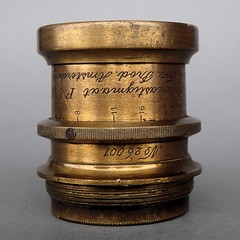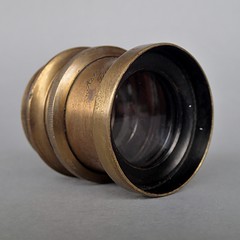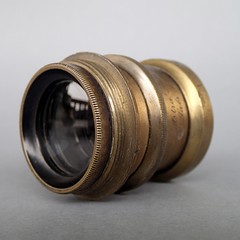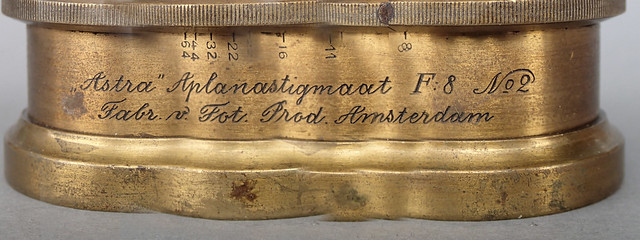Fabriek van Fotografische Producten Amsterdam
| ||||||
The Fabriek van Fotografische Producten was a Dutch lens manufacturer based in Amsterdam, on record during the late XIXth and early XXth century. Very little is known about the company, which seems to had some connections with E. Fischel Jr., an Amsterdam-based distributor of photographic supplies.[1] Fischel certainly used the brand 'Astra' for its products, including cameras, lenses, photographic papers and chemicals.[2]
Lenses
Catalogue Listing
The Dutch distributor E. Fischel Jr. lists under its own label "Astra" three brass lenses, with a total of seven variations, in this 1912 datalogue, and two brass lenses (three variations) in this 1925 catalogue.[3] They were presumably all made by the Fabriek van Fotografische Producten' using imported glass:
"Astra" Anastigmat
The "Astra" Anastigmat was described as a very elegant lens of modern appearance with identical lenses from the best sorts of Jena glass.[3][4]
- f/6.7 19cm for 13 x18[3]
"Astra" Aplanastigmat
The "Astra" Aplanastigmat[5] was described as a universal lens of short Anastigmat construction with lenses from the best sorts of glass.[3]
In addition, an Aplanastigmat lens of a different focal length has been observed (see below) :
- "Astra" Aplanastigmat Nº 2
- f/8 24cm (measured)[8]
Known Examples
So far production of the Fabriek van Fotografische Producten is on record from a single brass-bound lens,[9] labelled and marketed as 'Astra' (see above). It is a standard Aplanastigmat with with a 12-bladed diaphragm and maximum aperture of f/8.[10] The lens carries the following inscription:
Nº 26001[11]
„Astra“ Aplanastigmaat F8 nº 2
Fabr[iek] v[an] Fot[ografische] Prod[ucten] Amsterdam
It is unclear whether the lens is a rebadged unit from another German or, more probbaly, French supplier or whether it is of Dutch manufacture with bought-in glass.[12]
|
|
| ||||||
| ||||||||
|
„Astra“ Aplanastigmaat F8 nº 2 | ||||||||
Notes
Publications & Catalogues
Fischel, A (1912) De ozo-procédé's : ozotypie met gelatine, ozotypie met gom, ozobrome. Fotografische bibliotheek, 2.
Amsterdam : Fabriek van fotografische producten. 30 pp.
Links
- Total strip-down documentation of the „Astra“ Aplanastigmaat F8 nº 2 s/n 26001 (Photographica Collection Dirk HR Spennemann)
- Discussion the lens and company on www.analoogfotoforum.nl (in Dutch)
References
- ↑ See for ex. Fischel, A (1912) De ozo-procédé's : ozotypie met gelatine, ozotypie met gom, ozobrome. Amsterdam : Fabriek van fotografische Producten.
- ↑ See the 1914 advertisement in the Dutch photographic magazine Focus (vol. 1 nº 1, 10 January 1914, p. 1) Hans Kerensky photo.
- ↑ 3.0 3.1 3.2 3.3 3.4 3.5 Fischel, E (1925) Geïllustreerde catalogus.Nº 29. Amsterdam: N.V. fotohandel van E. Fischel Jr. p. 95.—Scan of relevant section [Dirk HR Spennemann] via Flickr
- ↑ The lens retailed in March 1927 for Dutch Guilders 53 (plus a 15% discount) (Fischel, E [1927] Catalogus 29 Prijsleutel nº 3. March 1927. Amsterdam: N.V. fotohandel van E. Fischel Jr. p. 24).
- ↑ It is worth noting that E. Fischel Jr. also marketed an Aplanastigmat engraved with his own company name (worthpoint).
- ↑ The lens retailed in March 1927 for Dutch Guilders 20 (Catalogus 29 Prijsleutel nº 3, p. 26).
- ↑ The lens retailed in March 1927 for Dutch Guilders 33 (plus a 15% discount) (Catalogus 29 Prijsleutel nº 3, p. 26).
- ↑ „Astra“ Aplanastigmaat F8 nº 2 s/n 26001 (Photographica Collection Dirk HR Spennemann) .
- ↑ at the time writing January 2014.
- ↑ The f/stops are marked in standard fashion: 8, 11, 16, 22, 32, 44, 64.—The lens measures: height 46mm, max Ø41m, mounting thread Ø37mm, weight 132g.
- ↑ Given that no references could be found to other „Astra“ Aplanastigmaat lenses in major collections or on the Internet, it is quite probable that the high serial number is fictitious.
- ↑ A total strip-down of the lens showed some design peculiarities that are not common to German or French lenses of the time, in particular the recessed retaining ring for the lens elements (see the discussion in the description of this photo of the lens.—Yet an example of a front section of a AJ Pipon Aplanascope 18x24 shows a similarly recessed ring on the rear section (large format photography forum).



